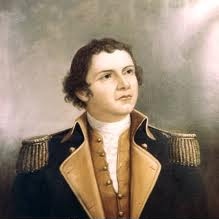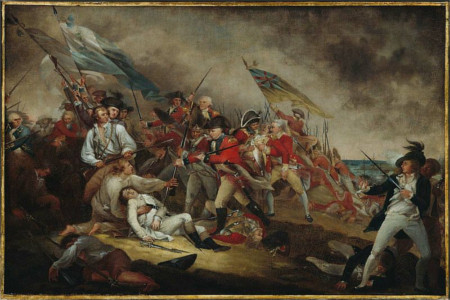Hugh Mercer was a doctor who emigrated to America, fought in the Seven Years War, and died in the American Revolution. He was a colonel alongside George Washington and a close friend until his death.

General Hugh Mercer
General Hugh Mercer was born in Scotland. At the age of 15 he attended the University of Aberdeen where he became a doctor. He served as an assistant surgeon and army doctor for the army of Bonnie Prince Charlie in 1746 and 1747. When Charles’ Army was destroyed and the survivors were hunted down and killed, Mercer went on the run. He bought a ticket to America and began practicing medicine in Pennsylvania.
French and Indian War
In 1755, he began fighting again, this time for the same army that had previously hunted him: The British Redcoats in the French and Indian War. He worked his way through the ranks, earning himself a captain’s commission in a Pennsylvania regiment.
In one particular raid on an Indian village, he sustained injuries and was separated from his unit, forcing him to walk 100 miles in 2 weeks with no supplies. He was promoted to colonel on his return and met another colonel with whom he became friends, George Washington.
He was a respected colonel, and when the General John Forbes’ failing health forced him to leave, he left Mercer in charge of Fort Pitt, where they were stationed. Mercer built a fort to hold back the French, which was called “Mercer’s Fort.”
Home Life
He settled down after the war, opened an apothecary (which is now a museum), and went back to practicing medicine. He purchased quite a bit of land for himself in a small Scottish community in Fredericksburg, Virginia, and he joined the Masonic Lodge in Fredericksburg in 1767, the same one in which George Washington and James Monroe were members. He sat as Master a few years later.
He married and had five children. His practice flourished. He took on Washington’s mother as a patient and he even bought Ferry Farm, Washington’s childhood home. He had every intention of settling there happily with his children and establishing a home for them.
In 1775, Hugh Mercer got involved in local politics. He was part of the Fredericksburg Committee of Safety who notified his friend Colonel George Washington that the British had removed gunpowder from the magazine at Williamsburg.
Revolutionary War
On January 11, 1776, he was appointed Colonel of the 3rd Virginia Regiment. That June he was appointed Brigadier-General in the Continental Army. While Washington was building a fort on the New York side of the Hudson River—Fort Washinton—, Colonel Hugh Mercer oversaw the building of one on the New Jersey side, called Fort Lee. Fort Lee had to be abandoned when Fort Washington was taken by the British in November.
Hugh Mercer was key in the Battle of Trenton, the famous American victory, and also in the Second Battle of Trenton, he was partly responsible for the defense of the city.
Battle of Princeton

“The Death of General Mercer at the Battle of Princeton, January 3, 1777” by John Trumbull | Mercer is the center figure fighting off the Redcoat by his fallen horse.
On January 3, the army met two British regiments and a mounted unit on their way to Princeton, New Jersey. When Mercer’s horse was shot from beneath him, he fell. The British thought he was Washington, surrounded him, and demanded his surrender. Rather than lose, he fought back with his saber. He was beaten down and stabbed seven times with a bayonet.</p>
<p>Legend has it that he refused to leave his soldiers, so they propped him up against a white oak tree and defended him. Whether this is true or not isn’t proved, but the “Mercer Oak” is now the seal of Mercer County, New Jersey.</p>
<p>When Washington heard of the attack, he met with Mercer’s retreating men, and rallied them back to the fight. The won the fight and Mercer was taken to the field hospital. He was tended by physician <a href=”benjamin-rush.html”>Benjamin Rush</a> for 9 days, but he died of his wounds on January 12, 1777.</p>
It seems pretty safe to say that Hugh Mercer was instrumental in winning the American Revolutionary War. This skirmish allowed Washington to win the <a href=”battle-of-princeton.html”>Battle of Princeton</a>. Encouraged by those victories, soldiers re-enlisted rather than return home defeated. Because of Hugh Mercer’s sacrifice, France was encouraged and believed those following victories were proof America could win this war, and they provided the Americans with assistance.


